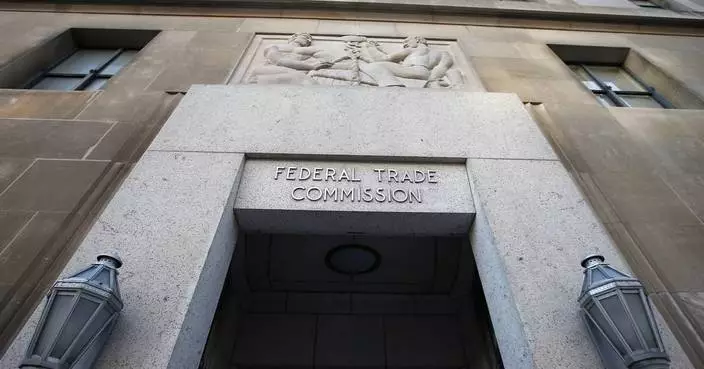COPENHAGEN, Denmark (AP) — Swedish authorities accused Iran on Tuesday of being responsible for thousands of text messages sent to people in Sweden calling for revenge over the burnings of Islam's holy book in 2023. Iran denied the accusation.
According to officials in Stockholm, the cyberattack was carried out by Iran’s paramilitary Revolutionary Guard, which hacked an SMS service and sent “some 15,000 text messages in Swedish” over the string of public burnings of the Quran that took place over several months in Sweden during the summer of 2023.
Senior prosecutor Mats Ljungqvist said a preliminary investigation by Sweden’s SAPO domestic security agency showed “it was the Iranian state via the Iranian Islamic Revolutionary Guard Corps, IRGC, that carried out a data breach at a Swedish company that runs a major SMS service.”
The Swedish company was not named.
The Iranian Embassy in Sweden in a statement rejected the accusation as “baseless” and said it was intended to “poison” relations between Tehran and Stockholm, the official IRNA news agency reported. The embassy expects the Swedish government to prevent the spread of such statements, the report said.
In August 2023, Swedish media reported that a large number of people in Sweden had received text messages in Swedish calling for revenge against people who were burning the Quran, Ljungqvist said, adding that the sender of the messages was “a group calling itself the Anzu team.”
Swedish broadcaster SVT published a photo of a text message, saying that “those who desecrated the Quran must have their work covered in ashes” and calling Swedes “demons.”
The protests were held under the freedom of speech act, which is protected under the Swedish constitution. The rallies were approved by police. However, the incidents left Sweden torn between its commitment to free speech and its respect for religious minorities.
The clash of fundamental principles had complicated Sweden’s desire to join NATO, an expansion that gained urgency after Russia’s full-scale invasion of Ukraine but needed the approval of all alliance members.
Turkey and its President Recep Tayyip Erdogan had temporarily blocked Sweden's accession, citing reasons including anti-Turkish and anti-Islamic protests in Stockholm but Sweden finally became a NATO member in March.
At the time, the Swedish government said it “strongly rejects the Islamophobic act committed by individuals in Sweden,” adding that the desecrations did not reflect the country's stand.
In July last year, Iran’s supreme leader Ayatollah Ali Khamenei issued a statement saying that “the insult to the Holy Quran in Sweden is a bitter, conspiratorial, dangerous event” and that the desecrations have “created feelings of hatred and enmity" in Muslim nations toward the people burning the Quran and their governments.
In a separate statement, SAPO’s operational manager Fredrik Hallström said Tuesday that the intent of the text messages was to "paint the image of Sweden as an Islamophobic country and create division in society.”
He accused “foreign powers" of seeking to “exploit vulnerabilities” and said they were "now acting more and more aggressively, and this is a development that is likely to escalate.” He did not name any specific country.
Meanwhile, Sweden's justice minister, Gunnar Strömmer, told Swedish news agency TT “that a state actor, in this case Iran, according to (SAPO's) assessment is behind an action that aims to destabilize Sweden or increase polarization in our country is of course very serious.”
There is no law in Sweden specifically prohibiting the burning or desecration of the Quran or other religious texts. Like many Western countries, Sweden doesn’t have any blasphemy laws.
“Since the actors are acting for a foreign power, in this case Iran, we make the assessment that the conditions for prosecution abroad or extradition to Sweden are lacking for the persons suspected of being behind the breach,“ Ljungqvist said.
Ljungqvist, who is with the Sweden's top prosecution authority, said that although the preliminary investigation has been closed, it “does not mean that the suspected hackers have been completely written off” and that the probe could be reopened.
Sweden’s domestic security agency in May accused Iran of using established criminal networks in Sweden as a proxy to target Israeli or Jewish interests in the Scandinavian country.
Iran’s Embassy in Sweden could not be reached for a comment on Tuesday.
Associated Press writer Jari Tanner in Helsinki contributed to this report.

FILE -A demonstrator throws an egg at the Swedish Embassy during a protest for the desecration of the Quran in Sweden, July 21, 2023, in Tehran, Iran. (AP Photo/Vahid Salemi, File)

FILE -A demonstrator holds up a copy of the Quran, Islam's holy book, during a protest of the burning of a Quran in Sweden, in front of the Swedish Embassy in Tehran, Iran, June 30, 2023. (AP Photo/Vahid Salemi, File)
NEW YORK (AP) — U.S. stocks drifted to more records Tuesday after Chinese stocks soared following a slew of moves by the Chinese central bank to prop up the world’s second-largest economy.
The S&P 500 rose 0.3% to set an all-time high for the 41st time this year. The movements were tentative, though, and the index wavered up and down following a surprisingly weak report released in the morning on confidence among U.S. consumers.
The Dow Jones Industrial Average added 83 points, or 0.2%, to its own record set the day before, while the Nasdaq composite gained 0.6%.
Financial markets have been mostly ebullient after the Federal Reserve made a drastic turn last week in how it sets interest rates. It’s now lowering rates to make things easier for the U.S. economy after keeping them high for years in hopes of extinguishing high inflation.
One of the risks still hanging over the market is the struggling Chinese economy and how much its flagging growth may affect the rest of the world. After earlier delivering some modest and piecemeal moves, the chief of China’s central bank on Tuesday announced a broad set of changes to bolster its economy, including a reduction in the amount of reserves banks are required to keep.
Analysts called the coordinated moves encouraging, and they helped stocks soar in China. Indexes jumped 4.2% in Shanghai and 4.1% in Hong Kong. But questions still remain about how much they will boost the economy, which has been struggling since Chinese authorities cracked down on excessive borrowing by property developers.
Prices climbed for crude oil and other commodities that a healthy Chinese economy would devour. Copper rose 3.3%.
Another risk hanging over Wall Street is the slowing U.S. job market. Now that inflation has eased substantially from its peak two summers ago, the main worry occupying investors is that a slowdown in hiring by U.S. companies may worsen.
Moves to interest rates can take a notoriously long time to make their way fully through the economy, and the Federal Reserve kept its main interest rate at a two-decade high for more than a year before last week. It did cut by an unusually large amount in hopes of providing relief to the job market and economy.
A report released Tuesday showed U.S. households are feeling more worried about the job market. Their overall confidence level sank in September, according to the Conference Board, instead of rising like economists expected. That’s a big deal because spending by U.S. consumers is the heart of the U.S. economy.
AutoZone’s stock slipped 0.2% after the seller of auto replacement parts and accessories said a key measure of its sales performance among its U.S. stores barely grew during the latest quarter. It was part of an underwhelming report where its profit and revenue both fell short of analysts’ expectations.
AutoZone said it’s continuing to see customers at its U.S. stores delay purchases of non-essentials.
Another company that depends on the appetite of U.S. shoppers for non-essentials, Thor Industries, rose 6.1% following a mixed profit report. The maker of recreational vehicles reported better profit and revenue for the latest quarter than analysts expected, but it also gave a forecast for its upcoming fiscal year that sees the RV market continuing to be challenged.
“The talk of a softer market is beginning to sound like a broken record, but we remained focused on managing through it with increasing efficiency,” CEO Bob Martin said.
One of Wall Street’s bigger winners was Smartsheet, which helps companies manage projects and automate workflows. It rose 6.5% after Blackstone and Vista Equity Partners agreed to buy it in an all-cash deal valued at $8.4 billion.
In the bond market, Treasury yields slipped following the weaker-than-expected report on consumer confidence. The 10-year yield fell to 3.73%, from 3.75% late Monday. The two-year yield, which more closely tracks expectations for the Fed’s upcoming moves, fell to 3.53% from 3.59% late Monday.
Yields sank as traders upped their forecasts for how much the Federal Reserve will cut interest rates by at its next meeting in November. They’re now betting on a nearly 61% probability of another bigger-than-usual cut of half a percentage point. That’s up from a 53% probability the day before, according to data from CME Group.
Wall Street loves lower interest rates because they can give the economy a boost by making it less expensive to borrow money to buy a car, house or things on credit cards. They also tend to give a boost to prices for all kinds of investments.
Nvidia’s jump of 4% was the strongest force lifting the S&P 500 index Tuesday. The chip company’s stock had sunk 27% during the summer on worries that its price had shot too high in the frenzy around artificial-intelligence technology. But lower rates dampen that criticism by a bit, and Nvidia has been rallying back since early August.
All told, the S&P 500 rose 14.36 points to 5,732.93. The Dow added 83.57 to 42,208.22, and the Nasdaq composite gained 100.25 to 18,074.52.
In stock markets abroad, indexes rose across much of Europe and Asia. France’s CAC 40 jumped 1.3%, South Korea’s Kospi rose 1.1% and Japan’s Nikkei 225 added 0.6%.
AP Business Writers Elaine Kurtenbach and Matt Ott contributed.
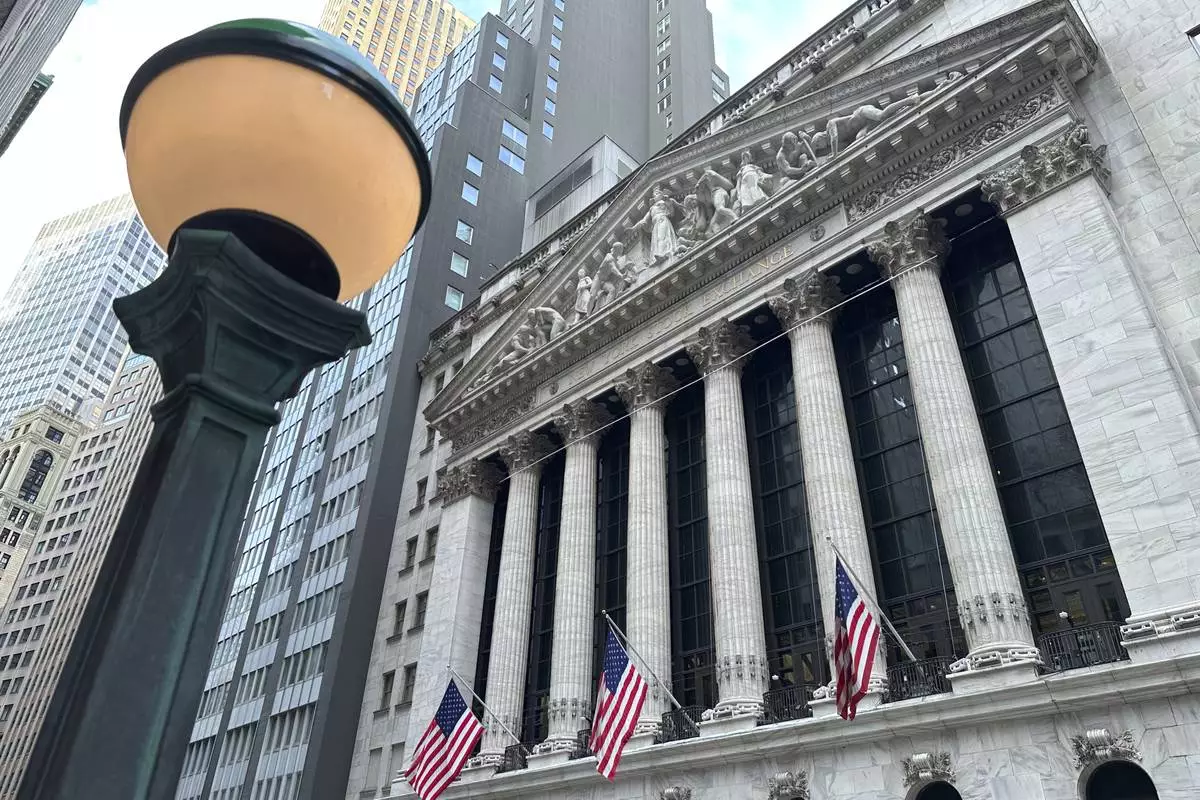
The New York Stock Exchange is shown on Tuesday, Sept. 24, 2024, in New York. (AP Photo/Peter Morgan)
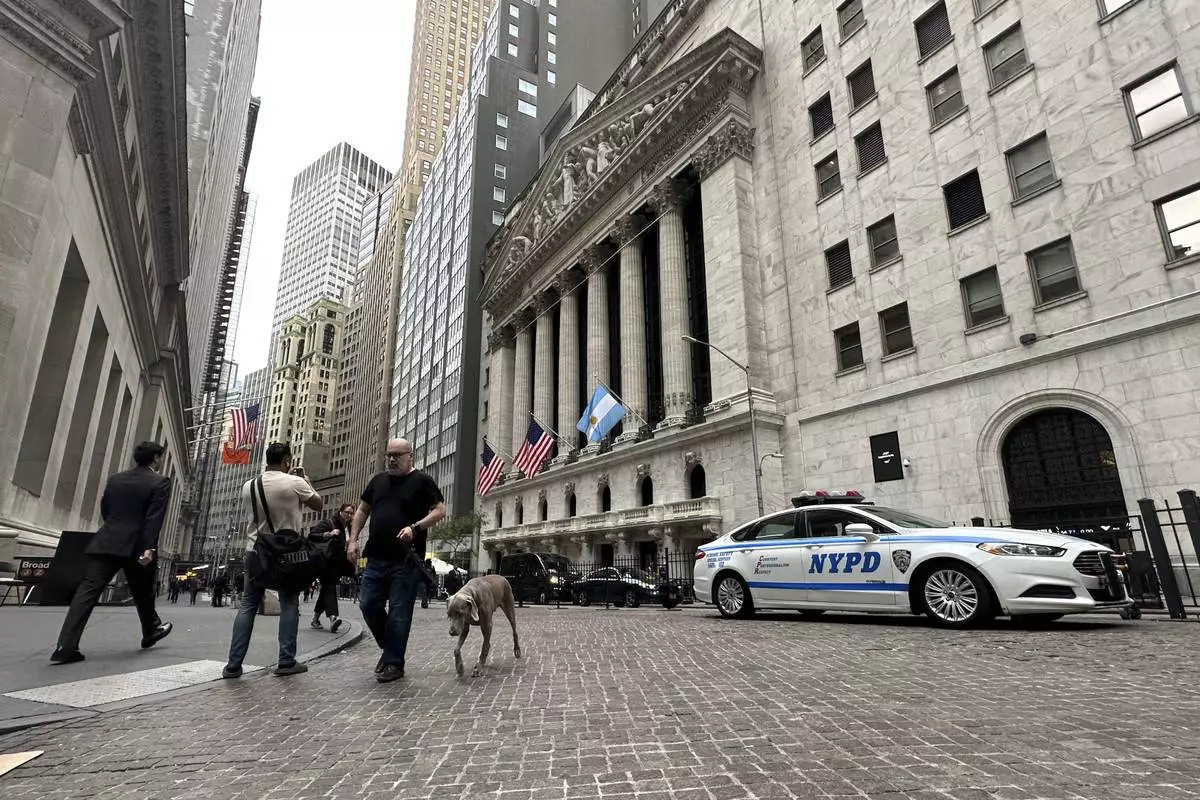
The flag of Argentina flies on the front of the New York Stock Exchange where Argentine President Javier Milei will ring the opening bell on Monday, Sept. 23, 2024, in New York. (AP Photo/Peter Morgan)
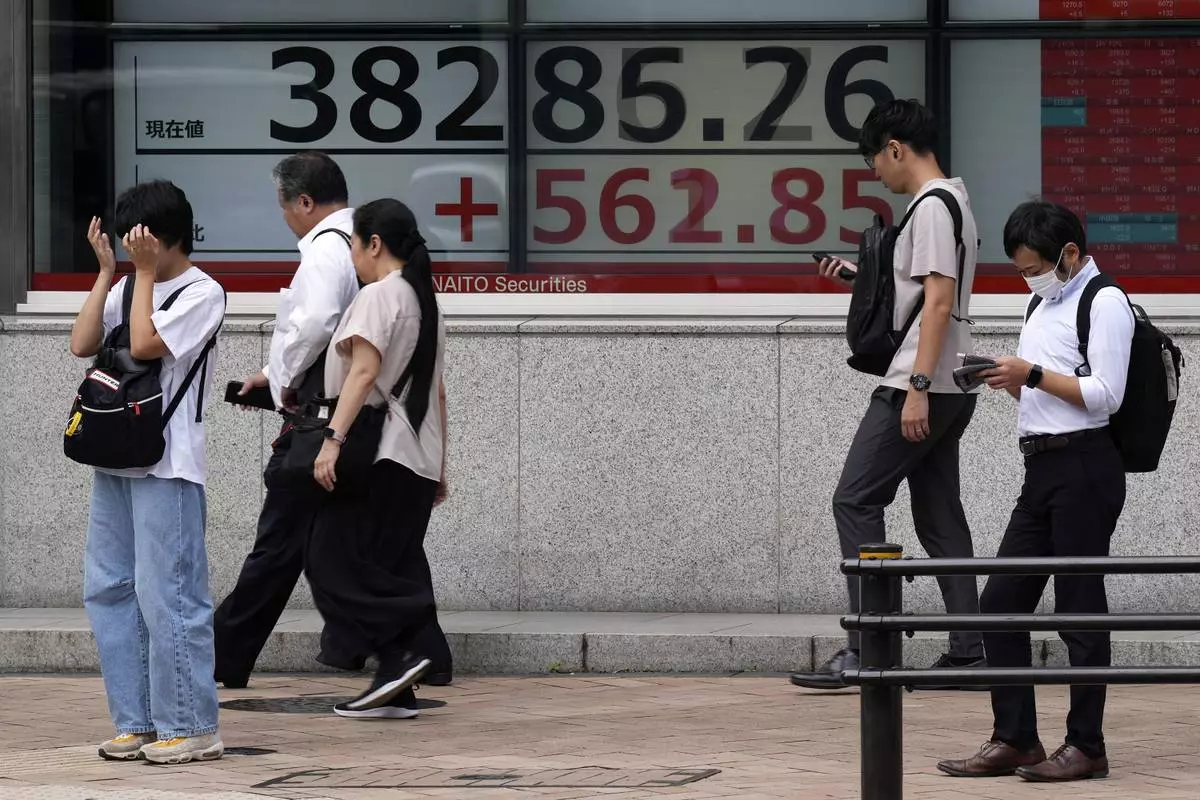
People walk in front of an electronic stock board showing Japan's Nikkei index at a securities firm Tuesday, Sept. 24, 2024, in Tokyo. (AP Photo/Eugene Hoshiko)
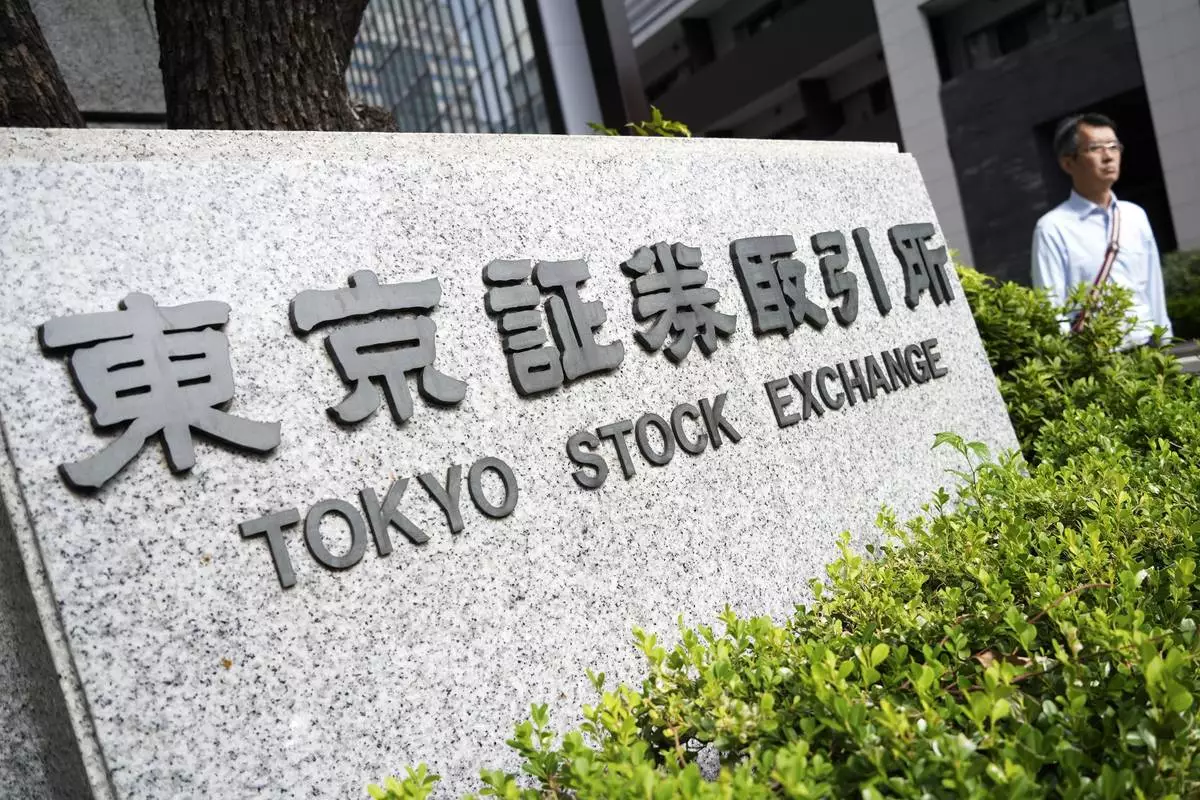
The Tokyo Stock Exchange building is seen Tuesday, Sept. 24, 2024, in Tokyo. (AP Photo/Eugene Hoshiko)
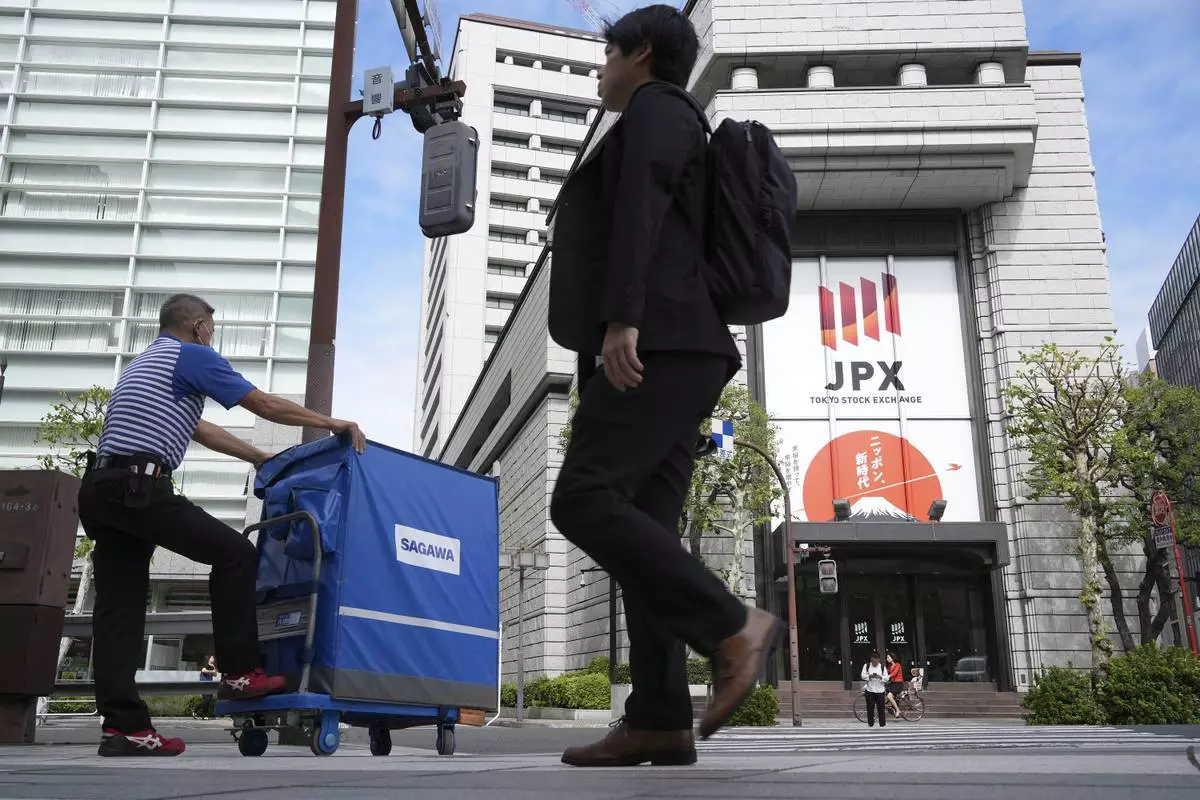
The Tokyo Stock Exchange building is seen Tuesday, Sept. 24, 2024, in Tokyo. (AP Photo/Eugene Hoshiko)
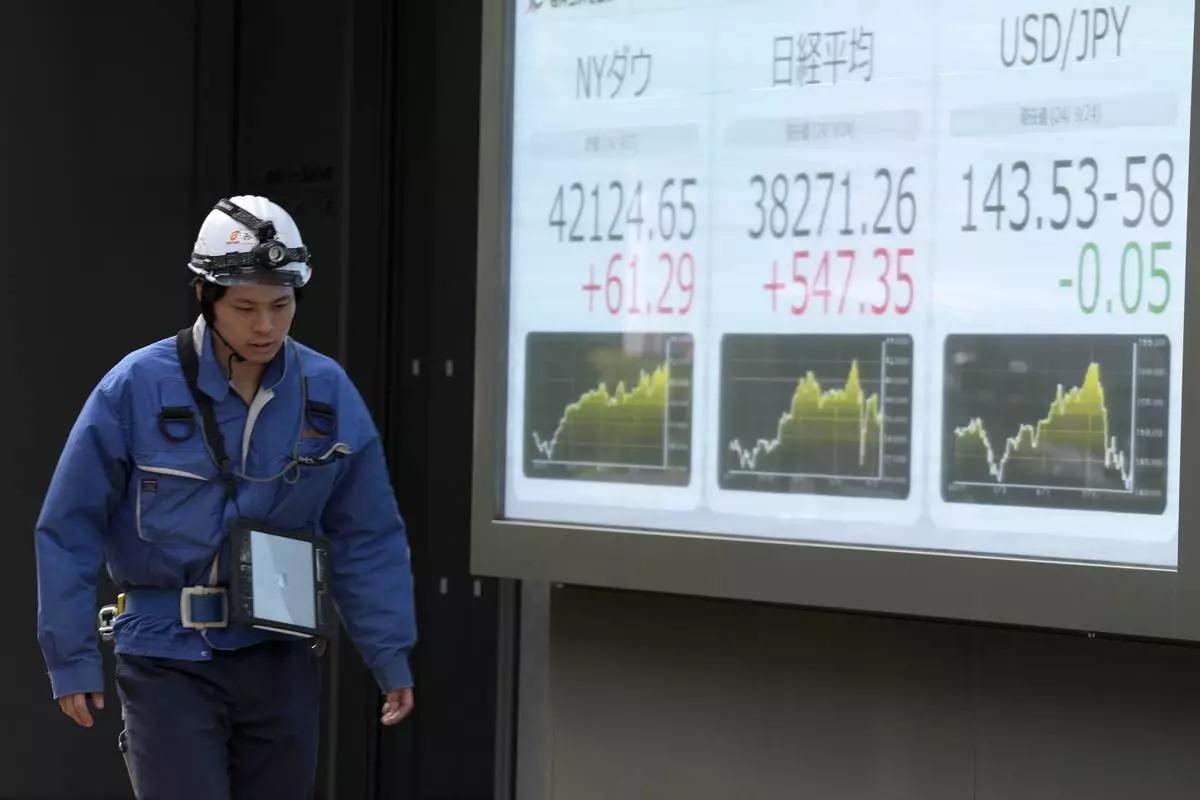
A person walks in front of an electronic stock board showing New York Dow, Japan's Nikkei indexes and U.S. dollar/Japanese yen exchange rate at a securities firm Tuesday, Sept. 24, 2024, in Tokyo. (AP Photo/Eugene Hoshiko)
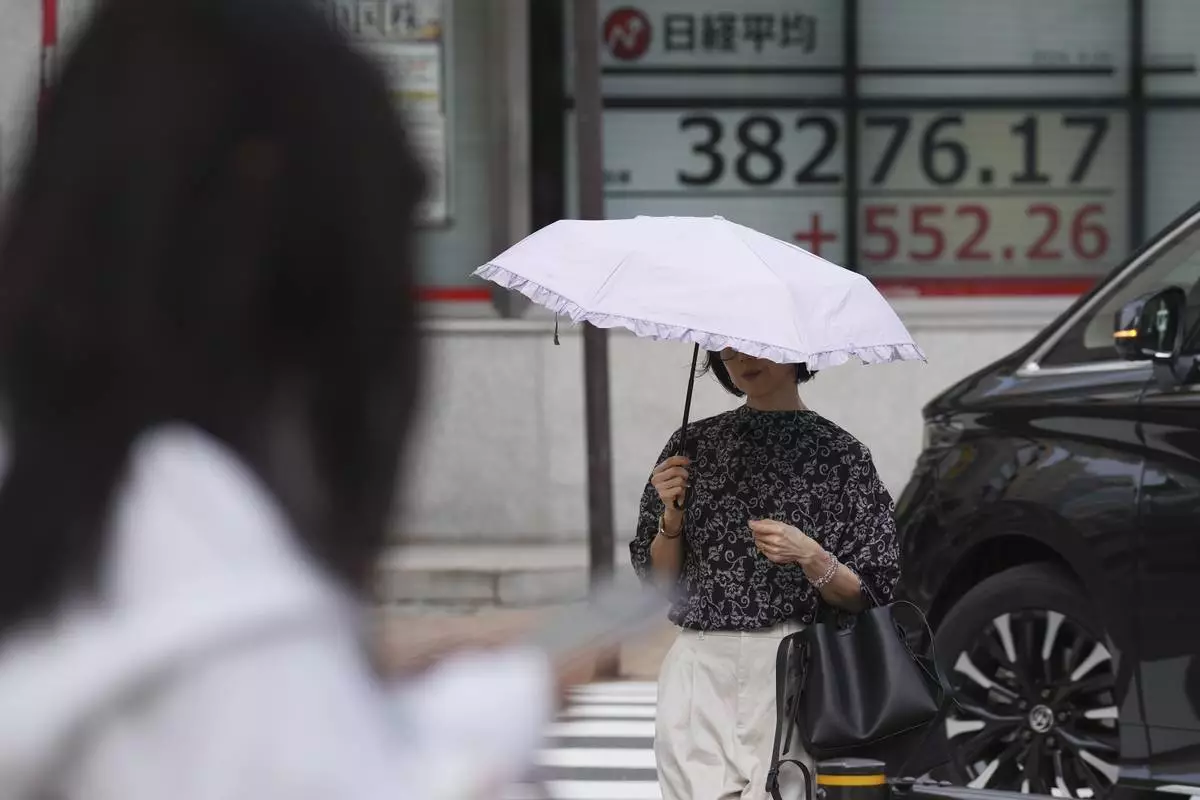
A person walks near an electronic stock board showing Japan's Nikkei index at a securities firm Tuesday, Sept. 24, 2024, in Tokyo. (AP Photo/Eugene Hoshiko)
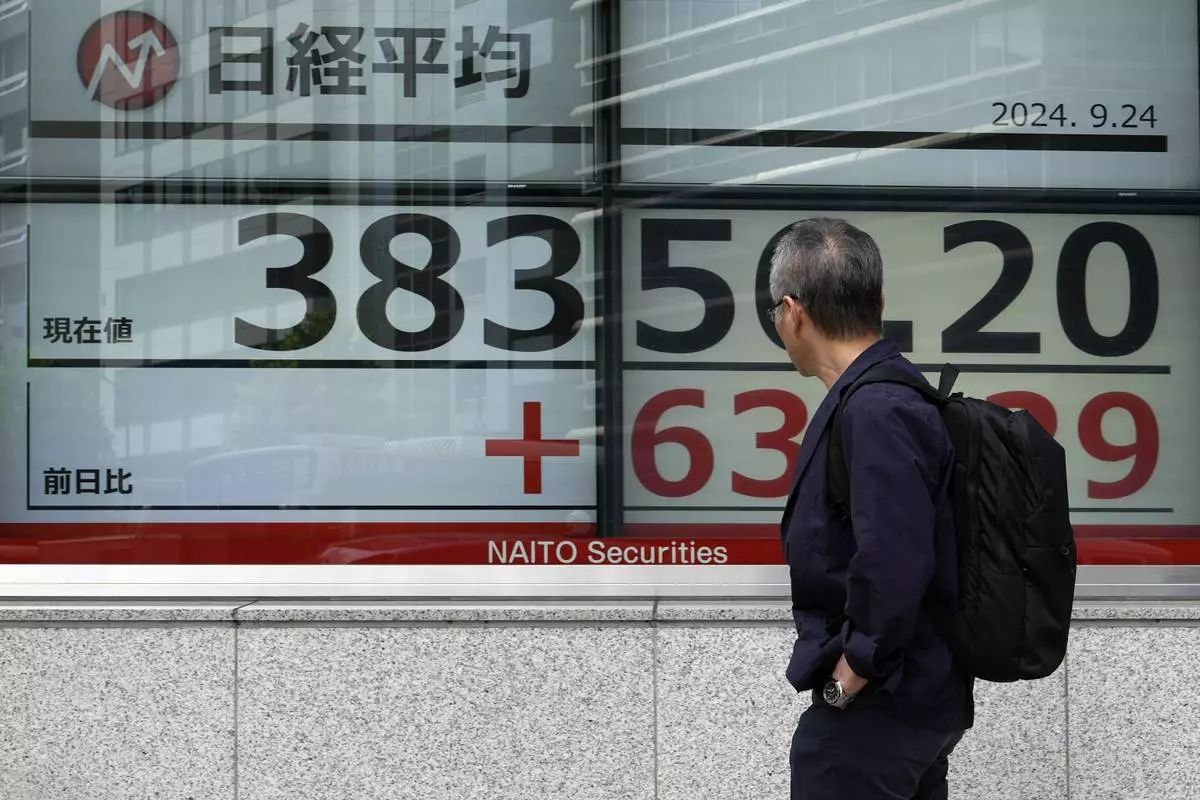
A person looks at an electronic stock board showing Japan's Nikkei index at a securities firm Tuesday, Sept. 24, 2024, in Tokyo. (AP Photo/Eugene Hoshiko)













